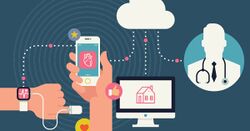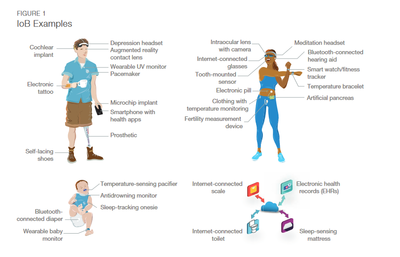Digital healthcare
(surveillance technology, medical concept) | |
|---|---|
 | |
| Interest of | • Jonathan Adiri • Michelle Dipp • Galvani Bioelectronics • Sara Saeed Khurram • Daniel Korski • Stéphanie Lacour • Olivier Oullier • Anne Wojcicki |
| With less an less human doctors in the system, the goal is ultimately that most diseases will be treated automatically and with [{Big Pharma drugs. Opting out is not an option.]] | |
Digital healthcare is the convergence of digital and genomic technologies with the fields of health, healthcare, lifestyle and society, with the stated objective of improving the efficiency of healthcare delivery and make medicines more personalized and precise.
The way digital health is planned and implanted by the Powers-that-be, it is an abandonment of the right to bodily autonomy, privacy and the right to make decisions about one's own health, combined with an open door for Big Pharma products and at the same time leaving everyone at the mercy of deep state agencies.
Internet of Bodies

The Internet of Bodies (IoB) is a collection of devices that are connected to the Internet that contain software and that either collect personal health data about a person or can alter the body's function.
There are still basic unregulated questions about whether individuals have ownership over their personal data or have the right to opt out of data collection.[2], but given the way privacy rules have been destroyed during COVID-19 deep event, this is a moot point.
The selling point is that the "unprecedented amounts of personal health data could inform treatment plans that are completely tailored to a patient's needs."[3] The other side of the coin is that deep state forces are given the opportunity to control anyone's life and health, and could assassinate someone remotely and without trace if needed.
Examples
- Artificial pancreases could automate insulin dosing for diabetics. Since an overdose of insulin is deadly, the one that controls the system controls their life.
- Implantable microchips RFID and near-field communication (NFC) microchips implanted into human bodies to store information, such as one’s name and address (akin to the chips many pet owners put in their dogs). Some can be programmed to unlock doors or pay for goods, similar to smartphone payment systems,[4] and of course to refuse to open doors or give payment.
- Brain-computer interfaces could allow amputees to control prosthetic limbs with their minds.[2]
- Newer cardiac pacemakers and implantable cardioverter defibrillators can provide real-time and continuous information about a patient's cardiac fluctuations. Internet connectivity introduces the potential for these devices to be hacked and the data they transmit to be compromised.[2]
- Freestanding infusion pumps that integrate medication databases with infusion pumps and allow for automation of alarm systems that alert providers when programming errors have occurred. Other systems connect the infusion pump to a patient’s Electronic Health Records, ending the need to program the pump.[4]
- Bluetooth-equipped electronic pills are being developed to monitor the inner workings of your body[5], with an electronic sensor that let a health care provider -or others - know whether you have taken the medication.[3] The US Food and Drug Administration (FDA) approved the first digital pill with embedded sensors in 2017.
- IoB bracelets, watches, rings, and smartphone apps can track steps, heart rate, sleep patterns, and other physical data, such as alcohol consumption.
- Artificial intelligence (AI) software companies are developing systems that can detect and collect data on human emotions by analyzing facial expressions, voice intonations, and other audio and visual signals. [4]
- Wearable neuro-devices. Head-wearable neuro-devices record and monitor brain activity and stimulate the brain through electrical signals. Some are used to encourage the user to perform brain exercises. Others might send electrical signals to the brain to treat such conditions as chronic pain, depression, attention deficit disorder, and post-traumatic stress disorder.[4] The fantasy is the limit.
- RAND researcher Mary Lee predicts "You could even have an artificial lens implanted in your eye to correct your vision, but such lenses could also one day record everything you see.[5]
- Internet-connected furniture and appliances that track and offer feedback on the user’s well-being at home. These include toilets that monitor urine flow and sugar levels and report results through an app; scales that are integrated with health apps to track and analyze fluctuations in body weight, body-mass index, and water weight; and beds equipped with sensors that connect to sleep-tracking apps to gather and record data on sleep patterns [4]
- Disease surveillance depends on data capture from a large number of individuals and hospitals spanning great geographic distances. IoB lends itself particularly well to this purpose because sensors built into smartphones, wearable devices, and such public facilities as toilets or door handles could all be used to detect the presence of disease and track its spread throughout the population. This could enable intervention of such epidemics or pandemics as measles, Ebola, or the flu. Particularly noteworthy is the ability of IoB devices to determine the number of people who have come into contact with a disease but are not symptomatic, the so-called silent carriers.[5]
- Amazon has patented technologies for a wristband designed to track and record workers' locations and hand movements. If the wristband senses a lull in productivity, then it would vibrate to warn the employee to focus.[2]
An example
| Page name | Description |
|---|---|
| The Commons Project | The World Economic Forum's vaccine passport enabler, providentially created in 2019. |
References
- ↑ https://www.rand.org/content/dam/rand/pubs/research_reports/RR3200/RR3226/RAND_RR3226.pdf
- ↑ a b c d https://www.rand.org/blog/articles/2020/10/the-internet-of-bodies-will-change-everything-for-better-or-worse.html
- ↑ a b https://www.rand.org/multimedia/video/2020/10/29/what-is-the-internet-of-bodies.html
- ↑ a b c d e https://www.rand.org/content/dam/rand/pubs/research_reports/RR3200/RR3226/RAND_RR3226.pdf
- ↑ a b c https://www.rand.org/blog/2018/10/the-perils-of-connecting-our-bodies-to-the-internet.html